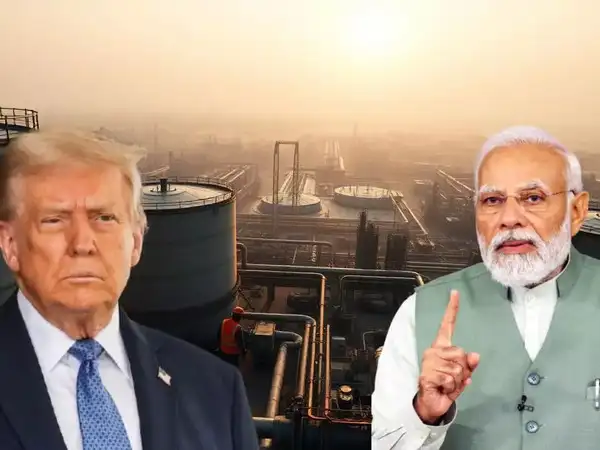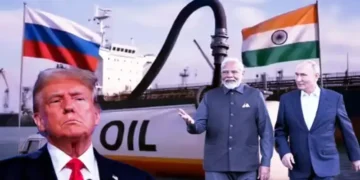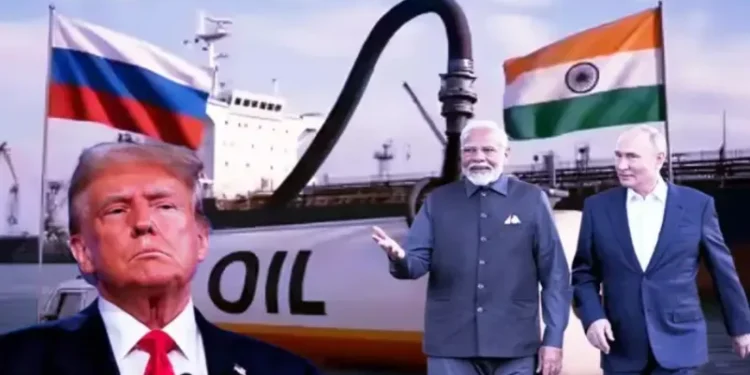Prime Minister Modi remains resolute against U.S. pressure, defending India’s continued purchase of Russian oil as a move driven by national interest and energy security.

Modi Defends India’s Russian Oil Imports Despite U.S. Pressure
India Asserts Its Energy Independence on Global Stage
Prime Minister Narendra Modi has taken a firm stance in defense of India’s continued imports of discounted Russian oil, even as pressure mounts from the United States and Western allies to cut economic ties with Moscow in response to the ongoing conflict in Ukraine.
Amid increasing global polarization following Russia’s invasion of Ukraine in 2022, India has charted a path of strategic autonomy—balancing its long-standing partnership with the United States while maintaining crucial energy and defense ties with Russia. This balancing act has come under intense scrutiny, particularly from Washington, which has been urging New Delhi to align more closely with the Western bloc and reduce its reliance on Russian energy.
The Energy Reality: Price and Pragmatism
India, the world’s third-largest oil consumer, imports over 80% of its crude oil requirements. Following Western sanctions on Russia, Moscow began offering steep discounts on its oil, and India significantly ramped up purchases to cushion the impact of global inflation and secure its domestic energy supply.
Speaking at a recent forum, PM Modi reiterated that India’s energy policy is guided by national interest and the welfare of its 1.4 billion citizens. “We will not let geopolitical pressures compromise our energy security. Our first duty is to our people and their development,” he stated.
New Delhi has consistently maintained that its oil purchases from Russia are legal and transparent, falling outside the scope of U.S. and EU sanctions which specifically target Western entities.
Washington’s Concerns: Strategic and Symbolic
U.S. officials have repeatedly voiced concerns that India’s continued trade with Russia could be seen as undermining the effectiveness of Western sanctions aimed at isolating President Vladimir Putin. They argue that oil revenues fuel Russia’s military aggression in Ukraine and that global powers must stand united in cutting off that lifeline.
In response, Indian officials have pointed out that Europe itself continued to buy Russian gas for much of 2022 and 2023 and still relies on alternative routes for energy despite vocal condemnation of Moscow.
External Affairs Minister S. Jaishankar, in a previous statement, had criticized what he called “hypocrisy” in the international system. “When the rules-based order is invoked selectively, it loses credibility,” he said.
Strategic Autonomy: A Core Principle
India’s foreign policy under Modi has emphasized “strategic autonomy”—the right to pursue independent decisions based on national interest, rather than aligning unilaterally with any bloc. This philosophy is evident in India’s neutral stance on the Russia-Ukraine war, abstaining from UN votes condemning Moscow while simultaneously calling for diplomacy and respect for territorial integrity.
Despite differences over Russia, India and the U.S. have strengthened their defense and economic ties in recent years. Washington views New Delhi as a key player in the Indo-Pacific, particularly as a counterbalance to China’s growing influence. However, India has made it clear that partnerships will not translate into policy subservience.
Domestic Priorities Over Global Optics
Experts say Modi’s government is also responding to domestic imperatives. With inflation concerns and a recovering post-pandemic economy, ensuring affordable energy remains a priority. Russian oil, priced below global benchmarks, offers a significant economic cushion.
“India cannot afford to pay premium prices for the sake of optics. The government has to make choices that keep fuel prices stable and protect the economic recovery,” said Anjali Verma, an energy economist.
Public sentiment in India has largely supported the government’s stance, viewing it as a demonstration of sovereignty and pragmatic leadership.
Looking Ahead: A Delicate Balance
As the global geopolitical environment remains tense, India’s balancing act between East and West will continue to draw attention. While it engages in high-level dialogues with the U.S., including participation in forums like QUAD and I2U2, New Delhi is unlikely to abandon its longstanding relationship with Moscow anytime soon.
India has also been diversifying its energy portfolio, increasing oil imports from the Middle East, Africa, and Latin America. But officials insist that the flexibility to buy from Russia—if it’s in India’s interest—must remain.
Modi’s firm stand on Russian oil is more than just an economic choice; it is a statement of India’s evolving global identity. As the country rises on the world stage, it is asserting not just its interests, but its right to make sovereign decisions in a multipolar world.
While Western allies may not fully approve, India’s message is clear: energy security and national interest will not be compromised by external pressures.
READ ALSO…….Army Revamp After Operation Sindoor: Drones to Join Battalion Ranks 2025















 Categories
Categories









